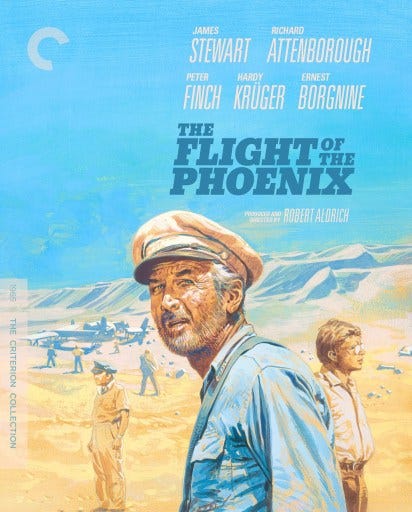Robert Aldrich’s action masterpiece gets a spiffy new transfer and special features

Over the better part of four decades, filmmaker Robert Aldrich, an iconoclast whose left-wing politics led to his disinheritance from the family fortune (and associated social ties), a pre-directorial career working his way up in Hollywood and early television work, directed almost 30 films of varying quality, budgets, and genres. Through major successes and career breakdowns that led to well-documented highs and lows, including the purchase of his own studio when Aldrich was flush with cash and a subsequent sale when he wasn’t, Aldrich still managed to contribute the better part of eight or nine films that have stood the test of film, chief among them Kiss Me Deadly, Aldrich’s acid-tinged, atomic-age noir (a perennial entry on best of film noir lists), and the latest, much-anticipated addition to the Criterion Collection, The Flight of the Phoenix.
An adaptation of the previous year’s bestseller, The Flight of the Phoenix centers on the ill-fated crew and passengers of a fictional oil company’s cargo plane moments before it flies headlong into a sandstorm. Almost immediately, the typically grizzled, sweaty captain, Frank Towns (James Stewart), and his navigator, Lew Moran (Richard Attenborough), realize they’re in serious trouble. Almost immediately, one engine sputters and dies in a flash-fire while the other all but gives up the mechanical ghost, leaving Towns and the cargo plane thousands of feet in the air without a means of propulsion or landing safely. Using whatever’s left of the skill set he developed during the Second World War, Towns brings the plane down hard but mostly intact in the Sahara, more than 130 miles off-course.

It’s to Aldrich’s considerable credit as a filmmaker instinctively averse to time-wasting that he opens The Flight of the Phoenix, if not entirely in media res, then in mid-flight, crew, passengers, and cargo loaded up and headed for their destination, Benghazi, Libya (yes, that Benghazi). The opening credits don’t even appear until roughly the seven- or eight-minute mark and when they do, Aldrich briefly freezes the film to give each actor their onscreen credit. It’s both bold and slightly laughter-inducing, but admirable nonetheless, especially given Aldrich practically skips to the crash minutes later. Once on the ground, the various characters and their individual personalities begin to slowly show themselves. Alliances and counter-alliances form, break up, and reform with different members.
Aldrich’s action-oriented filmmaking style wasn’t about big set pieces, though The Flight of the Phoenix obviously contains at least two (the crash and attempted escape), but about individual characters revealing themselves through what they do and what they say, specifically under personality-testing extremes like crashing in the desert with minimal food and even less water, an unlikely chance of rescue, and unsurprisingly, the increasing despair and despondency that threatens to turn the survivors from men of action into men of inaction and virtual suicide. One Brit officer, Captain Harris (Peter Finch), seeing himself as the hero in his (and their) story, decides the best course of action involves a night-time march to the nearest town or oasis, a plan that, while giving the men hope, seems all but doomed to fail.

Before the audience can even notice, The Flight of the Phoenix leaves the otherwise survival drama template behind and adopts something far more original, fresh, and novel (pun intended): A smug, self-entitled, deeply unlikable German, Heinrich Dorfmann (Hardy Krüger), a plane designer, offers a different path to potential salvation: Build a new, smaller plane from the single, intact engine and salvaged parts. It’s a plan the old-school Towns immediately rejects as foolhardy and unrealistic, setting up a film-long conflict between the seemingly rational Dorfmann and the emotional Towns with Moran as the go-between, navigating Dorfmann’s prickly personality, Towns’s radical doubts, and the other survivors and their own existential fears and anxieties.
It’s more text than subtext, but in Dorfmann and Towns, The Flight of the Phoenix pits not just two generations (Towns ruefully believes that scientists, engineers, and rationalists like Dorfmann will inherit the earth, Dorfmann dismisses Towns as someone who learned everything, but remembers nothing), but also pits the German Dorfmann, a man possibly too young to have actively participated in the Second World War, vs. the American Towns, a WWII fighter pilot (as was Stewart in real-life). With the war still relatively recent and fresh, it’s not surprising The Flight of the Phoenix hits more than a few topical notes, but it also doesn’t hit those notes too hard, depicting both men as sometimes right, sometimes wrong, and most definitely flawed.
That kind of complex, character-based layering in purportedly mainstream cinema rarely occurred then or now, making it not just welcome, but also a major reason why The Flight of the Phoenix, even with noticeable flaws, some narrative (e.g., casual and not-so-casual racism) and some technical (e.g., odd-fitting projection work for dialogue scenes), remains both an eminently watchable film almost sixty years later and a prime example of Aldrich’s efficient, economical, no-frills approach to filmmaking and a noteworthy addition to the action genre.
Specifications and Special Features

- 2K digital restoration, with uncompressed monaural soundtrack
- New conversation between filmmaker Walter Hill and film scholar Alain Silver
- New interview with biographer Donald Dewey on actor James Stewart and his service as a bomber pilot for the United States during World War II
- Trailer
- An essay by filmmaker and film critic Gina Telaroli
- New cover by comic-book artist Sean Phillips
Get it at Amazon:
If you enjoy reading Cinapse, purchasing items through our affiliate links can tip us with a small commission at no additional cost to you.



